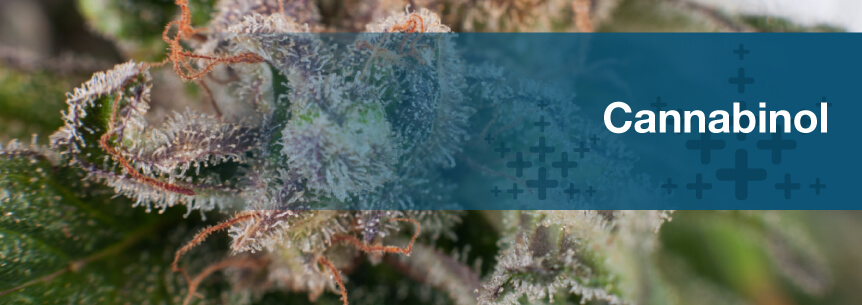
Cannabinoids are naturally occurring compounds you can find in the cannabis plant that give medical marijuana its healing properties. One of these cannabinoids is called cannabinol (CBN).


This work is licensed under a Creative Commons Attribution-NoDerivs 3.0 United States License. If you like our infographic, feel free to share it on your site as long as you include a link back to this post to credit Marijuana Doctors as the original creator of the graphic.
CBN is a cannabinoid and effective compound contributing to cannabis’ effects on your body and mind. Typically, compounds like CBD (cannabidiol) and THC (tetrahydrocannabinol) grab the most attention when it comes to marijuana’s effects. However, marijuana has many other compounds impacting your health positively. CBN is one such compound.
CBN complements the effects of THC, CBD and other cannabinoids, but it also provides its special effects. It’s a breakdown product of THC, weed’s most popular cannabinoid. THC is the marijuana plant’s primary psychoactive and is responsible for the notorious “high” you experience from the herb. And, as THC begins aging, it begins transforming into CBN.
CBN is one of the less well-known medical pot cannabinoids. Despite this, it is a significant component of the plant, interacting with your endocannabinoid system (ECS) to positively affect your health.
When THC, one of the two major cannabinoids, interacts with the air, it forms CBN. Savvy marijuana users make sure to keep their bud tightly sealed, so the THC in it doesn’t turn into CBN. However, that doesn’t mean CBN has nothing to offer patients in need of relief.
CBN mainly activates the CB2 receptors, which affect your immune system. It also interacts with the CB1 receptors to a lesser degree. The CB1 receptors work with your central nervous system, so you can get some related benefits from CBN.
Cannabinol works as a psychoactive compound like THC does, but it has a milder impact. When we talk about the two significant cannabinoids, THC and CBD, we often mention how THC causes psychoactive effects, while CBD doesn’t. CBN lies somewhere in between. While it has psychoactive properties, it doesn’t produce a “high” like THC does.
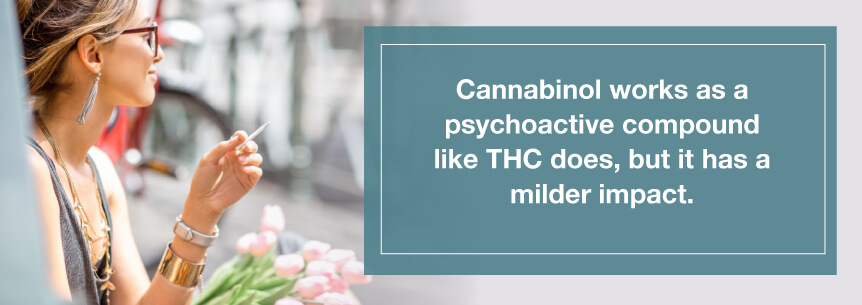
These unique traits let patients take advantage of CBN’s cerebral benefits without feeling impaired when they use it. While medicine containing THC can have considerable amounts of it, medication with CBN often has a smaller, but still effective, amount.
Like CBD and THC, CBN interacts with your body’s two ECS receptors (CB1 and CB2). However, researchers believe CBN has a more powerful connection with CB2.
CBN, unlike THC, produces very mild psychoactive effects, if any at all. Medical marijuana researchers believe this is due to CBN molecules not fitting into your brain’s CB1 receptors very well. The compound also has some difficulty binding to your CB2 receptors, although it binds better to CB2 receptors than CB1.
The compound has around 10 percent of THC’s psychoactive effects, which means you’d have to take around 100 milligrams of CBN to experience similar effects of 10 milligrams of THC.
The marijuana plant has a natural enzymatic process producing many cannabinoids, particularly within the trichomes. However, CBN isn’t produced the same way. THC’s degradation produces CBN instead. This process naturally occurs when cannabis gets exposed to lengthy and improper storage times, high temperatures and other particular conditions.
When compared with other major cannabinoids, CBN generally occurs in extremely small proportions in the marijuana plant — less than 1 percent.
CBN was the first cannabinoid researchers and scientists identified and isolated from cannabis. In the 19th century, researchers first isolated CBN through a cannabis extract degradation. Robert Sydney Cahn, a British chemist, identified its structure in the 1930s.
Researchers found about 789 grams of cannabis rich in CBN in a 2,700-year old China grave. This hidden supply of cannabis was the oldest discovered sample. The predominance of the CBN cannabinoid identified in these historical samples isn’t a surprise, since manufacturers have been producing CBN from THC degradation over long periods.
As with other cannabinoids, there’s ongoing clinical research into cannabinol’s potential medical properties. Some small peer-reviewed research on CBN is as follows:
Numerous researchers are enthusiastic about marijuana’s anti-cancer effects. CBN, in particular, was found to decrease the growth of a specific form of lung tumor.
Cannabinoids’ anti-cancer effects aren’t limited to lung cancer, either. CBN and other cannabinoids work by targeting different cellular pathways enabling cancers to invade, grow and spread throughout your body.
CBN, unlike these other cannabinoids, doesn’t directly originate from CBG, the precursor molecule, but instead comes from THCA’s oxidation.
Some earlier research shows CBN could have very mild psychoactive properties, whereas other research suggests it doesn’t have any.
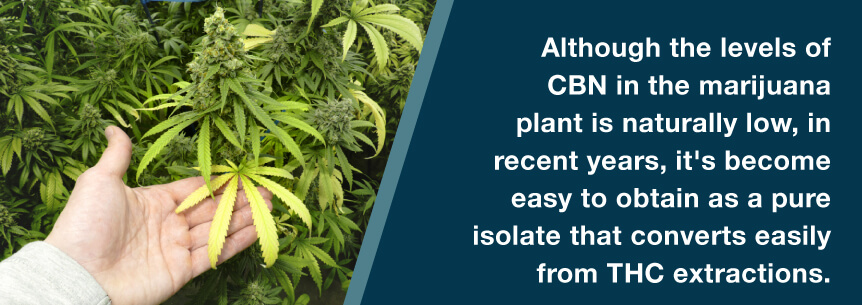
Although the levels of CBN in the marijuana plant is naturally low, in recent years, it’s become easy to obtain as a pure isolate that converts easily from THC extractions.
Although cannabinoid studies are lacking, some earlier research shows CBN might be far more beneficial than you thought. The research we have on CBN so far suggests the cannabinoid has the potential to treat a wide variety of conditions. CBN could help relieve symptoms of qualifying conditions such as:
We don’t have as much scientific evidence showing CBN’s benefits as we do for more prominent cannabinoids. However, the knowledge we do have looks promising for folks with many health issues. Cannabinol seems to have the following effects:
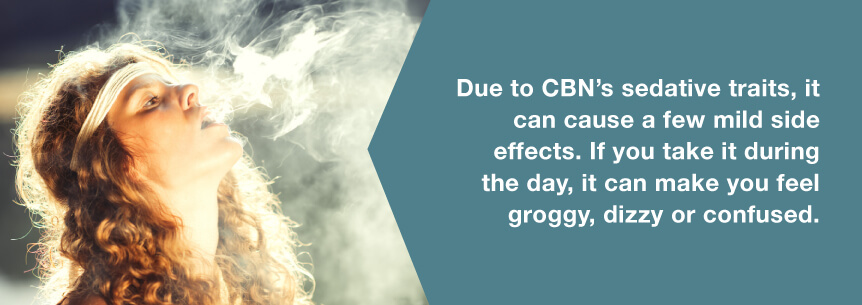
Due to CBN’s sedative traits, it can cause a few mild side effects. If you take it during the day, it can make you feel groggy, dizzy or confused. Patients who experience these symptoms can take their medication at night to avoid feeling these side effects in the daytime.
Fresh cannabis plants typically contain minimal CBN. CBN heightens THC’s effects and synergistically adds to what people commonly refer to as the “couch-lock” effect. It also results in drowsiness.
CBN can also leave individuals feeling dizzy, groggy or confused. Despite these potential side effects of CBN, its health benefits are considerable.
Those wondering about cannabinoids’ toxicity, like in CBN, can feel better knowing they’re safe, since CBN’s median lethal dosage (LD50) in mice is 13,500 milligrams per kilogram. Nicotine, on the other hand, has an LD50 of three milligrams per kilogram.
Until recently, you could only find CBN in certain pot strains in very small concentrations. And, extracts, until now, have been focusing on either CBD or THC. The good news is, growers are beginning to isolate and extract delta 8 THC and other less common cannabinoids. However, CBN is a bit different. Because it comes in flowers in minimal quantities, many haven’t seen a concentrated form of CBN like with delta 8 or THC-O-acetate. But, with CBN, small amounts go much further than what equal CBD and THC quantities would.
The ideal way you can get more CBN is to age your flower. Push the time back to your harvest if you’re growing from your house. Allow trichomes to start developing amber coloration before you cut your plant down. Then, let it dry and cure.
There’s no exact science to coaxing out CBN. Because it’s a THC breakdown product, various environmental factors could either slow down or speed up the conversion process. Four main factors breaking THC down include:
You obtain a higher CBN quantity when your buds sit out longer and have gone stale. But, who wants to vape or smoke stale flower? Ideally, you’d want to let the THC degrade while not sacrificing your bud’s overall quality.
Products rich in CBN are coming forth. Edibles, oils, patches and capsules pronouncing CBN profiles are rare. However, their reproduction will start growing undoubtedly with the attitude change towards marijuana. Before this time comes, keep your eye out for lab-tested concentrates and flowers with high levels of CBN.
Talk with a knowledgeable budtender and medical pot dispensary staff of CBN alternatives and CBN dosing information. You can find a local dispensary right on the MarijuanaDoctors.com website.
Because CBN derives from THC degradation, you’ll find a few reasonable concentration cannabis strains. You’ll also luck out if you can find a 1 percent or higher CBN strain. Some strains to consider for your CBN treatment containing more than 0.3 percent CBN include:
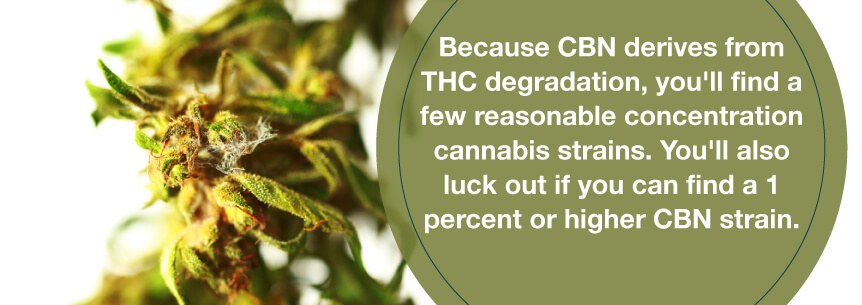
Once you find your ideal cannabis treatment strain with enough CBN, your next step will be identifying your unique route of administration for your treatment. You don’t necessarily have to smoke cannabis to reap its rewards. You’ll find a handful of other delivery methods to provide you with relief.
CBN cannabis delivery methods include:
Consult with a cannabis doctor who can assist you in matching your ideal cannabis healing strain to your diagnosis. They can also assist you in finding the proper dosage you should start off with. Once you visit a dispensary to buy your cannabis, the staff will educate you on various methods of delivery you’ll be comfortable with.
As you’ve read, CBN is hardly psychoactive like THC, but still provides you with therapeutic potential, making it a good substitute for individuals who want to avoid THC’s side effects, but still want to treat their medical condition.
CBN is still a relaxing and sedating cannabinoid, which people use around the world to treat their sleeping conditions. Since science and its community is catching up with this information and becoming more aware of it, researchers are conducting more studies involving this interesting cannabinoid, including many animal testing phase trials.
Given its effects and characteristics, you can look forward to enjoying high CBN concentration products soon — similar to the vast array of CBD-rich products you’re already finding like:
All these help to improve quality of life in those individuals who desperately need it. Also, many marijuana budtenders and breeders are working already on numerous different CBN-rich product varieties. That will no doubt help in the development of a new cosmetic and pharmaceutical cannabinoid-based industry.
Reach out today to a licensed medical cannabis doctor. If you’re interested in learning more about CBN, cannabis and your state’s legislation or if you need help locating a medical marijuana doctor and dispensary, look no further than Marijuana Doctors.
We can help you connect with your ideal cannabis doctor and locate a marijuana dispensary where you can begin treatment once you’re deemed qualified and receive your recommendation. Don’t forget to sign up for our newsletter as well so you can stay informed on up-to-date information, products, discounts and more regarding CBN and medical weed as a whole.